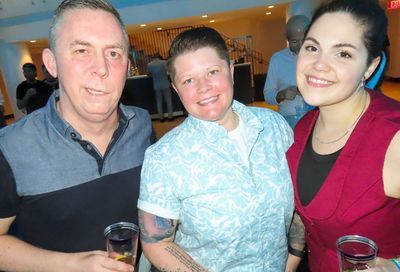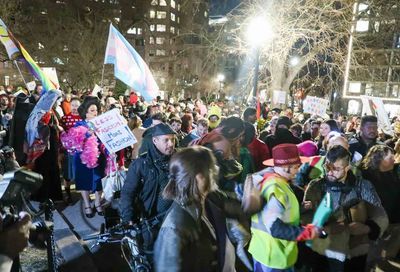Everyday Activists
A Town Square Opinion
I’m glad that I live in a country where people can feel free to express their opinions and views in many different ways. This expression can come in the form of a free press, public demonstrations, political action or social action. I lose sleep over this current Administration, which often seems to equate activism as unpatriotic. They promote and want to strengthen the Patriot Act, which was passed to defend us but in the end could curtail the very freedoms that we are fighting for around the world.
But I am also concerned when newspapers who cover activists’ actions every week question where the current activists are, as was done in a recent editorial in the Washington Blade. Executive editor Chris Crain’s editorial, “Where have the activists gone?” appears to overlook and denigrate all those who are fighting everyday to make a difference in our country and our community.
So, where are the activists? They are out there fighting for a sensible solution to the Iraqi war, for more funds for AIDS at home and around the world, for our right to marry, for money to deal with lesbian health issues, and for equality and civil rights for all GLBT persons. I am sure they will all join me in hoping that Crain didn’t sprain his wrist, as he sat in his cozy office, typing out that editorial chastising the GLBT community for their lack of activism.
The dictionary definition of activist is someone who takes decisive, sometimes militant, action in support of a political or social cause. For those of us who were brought up in the ’60s and tear-gassed at anti-war demonstrations, and who participated in sit-ins and protest actions in the ’80s like “Hands Around the White House” to fight for funds to combat AIDS, today’s protests may seem a little pale. But let us not denigrate those thousands of people who lined up for marriage licenses in San Francisco, and those who for days demonstrated in and around the Massachusetts statehouse, by not calling them activists. Let us not denigrate those who fought for AIDS funding and are now working for the organizations that now use those funds to help those with AIDS/HIV because of success of their activism.
I think activists come in all colors, shapes and sizes and work in many ways. I may not agree with the Human Rights Campaign (HRC) very often, but there are many activists working for and volunteering with that organization. Recently, two thousand activists came out to demonstrate against the Federal Marriage Amendment at HRC headquarters.
Rep. Barney Frank (D-Mass.) and Rep. Tammy Baldwin (D-Wisc.) are activists every day of their lives by having the courage to stand up to their congressional colleagues and declaring, “We are gay and lesbian and you have to deal with us, and the Americans we represent.” Theirs may not be militant action, but it is decisive action. Members of the Gertrude Stein Democratic Club and the Gay and Lesbian Activists Alliance have been activists for many causes and have helped change both local and federal policies for the better.
It may take more courage today to call for rational movement forward in the area of marriage, than to plow ahead without thought as to the outcome of a particular fight. Crain’s premise, “that every time our issues are debated and discussed, we win, regardless of the outcome”, could well be questioned by some of those whose military careers were caught up in the “Don’t Ask, Don’t Tell” debate.
Our community is not monolithic. There are GLBT activists fighting in every area of public policy and they are making people think and consider options. They may not be sitting in at the headquarters of the Food and Drug Administration, but they could be fighting and funding legal battles against the drug companies to force them to provide AIDS drugs at prices people can afford.
There are political activists in both the Log Cabin Republicans and the Stonewall Democrats, fighting in their own ways to make all of our lives better according to their own visions. One must credit them as being activists even if we don’t agree with all they do.
Determining which battles to fight and how to fight them often brings out many differing opinions and action plans. The fight for racial equality has changed direction over the years because of the success of those demonstrations led by Martin Luther King, Jr. The fight for GLBT civil and human rights changed because of the actions taken by the heroes at Stonewall. The fight for women’s rights has taken on new directions because of the suffragettes who marched on Washington, and congresswomen like Bella Abzug, who helped found the women’s movement. Don’t disparage the activism of those who fight and struggle in myriad ways — militant action is only one tool in the quiver of activists and movements.
There are many unsung heroes in today’s GLBT movement. They are the people who pound the pavement for candidates, raise money for our causes, stand up at government hearings and their family dinner table, and speak out when it is not always easy to do so. They do this without guarantees that they will not lose their families or jobs. They have no guarantee that they won’t be targets for those who hate in their communities. They are true activists and it is their activism that will carry the day for all of us in the long run.
Peter D. Rosenstein is a longtime GLBT and political activist in Washington, D.C. Metro Weekly‘s Town Square is a forum for members of the Washington-area GLBT community to express their views on issues and topics of the day. For information and submission guidelines e-mail townsquare@metroweekly.com.
Support Metro Weekly’s Journalism
These are challenging times for news organizations. And yet it’s crucial we stay active and provide vital resources and information to both our local readers and the world. So won’t you please take a moment and consider supporting Metro Weekly with a membership? For as little as $5 a month, you can help ensure Metro Weekly magazine and MetroWeekly.com remain free, viable resources as we provide the best, most diverse, culturally-resonant LGBTQ coverage in both the D.C. region and around the world. Memberships come with exclusive perks and discounts, your own personal digital delivery of each week’s magazine (and an archive), access to our Member's Lounge when it launches this fall, and exclusive members-only items like Metro Weekly Membership Mugs and Tote Bags! Check out all our membership levels here and please join us today!





















